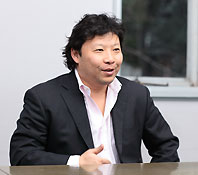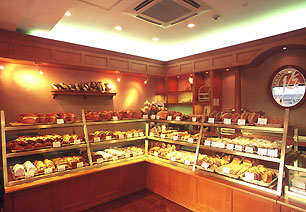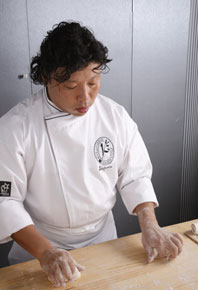Shuichiro Kimura, President, Boulangerie Eric Kayser Japon
Studied at Keio from Yochisha Elementary School to the Faculty of Law
After working for a life insurance company, studied baking in the U.S. and France
Then opened an outlet of Paris-based popular French bakery in Japan

Shuichiro Kimura,
President, Boulangerie Eric Kayser Japon
Born in Tokyo in 1969. Graduated from Keio Yochisha Elementary School, Keio Futsubu School, Keio Senior High School, and Keio University Faculty of Law. Joined what was then Chiyoda Mutual Life Insurance in 1991. Left the company at age 27, studied zymology and baking at the American Institute of Baking, and went to Paris to train under Eric Kayser. Founded Boulangerie Eric Kayser Japon in September 2000 as a partner of Eric Kayser and became president.
Starting a company of authentic French bread
─ "Maison Kayser" is a French bakery that uses natural leaven. Its first store opened in July of 2001. Today, it has 10 stores in Japan, and if you include the shops in department stores, a directly managed store in Singapore, and franchise stores in Korea and Taiwan for which it offers training, there are 25 stores in total. The founder of this company is Mr. Shuichiro Kimura. To begin with, please tell us about "Maison Kayser".
It is now common sense worldwide to use yeast for fermentation of bread, but in fact, research on yeast advanced only in the late 19th century. Bread has been made from way back, as early as in the ancient Egypt, using natural leaven. Chemical yeast became popular during World War II, when wheat fields turned into battlefields and wheat harvest yields dropped dramatically. Chemical yeast was treasured because the bread rose better with less wheat. Since then, commercial yeast with its productivity became the mainstream of leaven.
It was baker Eric Kayser who disagreed with this movement and went back to using natural leaven that offers better taste and flavor for bread-making, earning him high praise. His crispy baguettes and tasty croissants are very popular in Paris. Kayser suggested that we open a store in Japan when I was an apprentice at his bakery, so I founded a company and launched Maison Kayser. He is five years older than me and is also my business partner of the company in Japan.

─ Mr.Kimura, you are from the family that founded Kimuraya Sohonten., Ltd., famous for having invented an-pan (a sweet bu nfilled with sweet red bean paste) during the Meiji Era and for promoting bread culture in Japan. Your father is the former president. Is your company financed by Kimuraya Sohonten?
No, it hasn't received any financial support from Kimuraya. It is a completely separate company. However, I was in my twenties when I tried to start the company. I was so young that the banks wouldn't even deal with me, so I borrowed money from my aunt on my mother's side for initial funding. Needless to say, I paid back the money with interest.
However, business didn't go that well in the beginning. Back then in Japan, French bread meant the so-called "soft French bread", with a rather soft crust. It took time for our authentic French bread to be accepted, and there were struggles galore. First let me share a couple of funny stories. We decided to open our first store in Shirokane-Takanawa near my alma mater. On the day before opening, I noticed something was missing while checking inside the store, and it dawned on me that we still didn't even have a cash register! I jumped into my car, belted over to Kappabashi, and somehow begged a store that was about to close into selling me a cash register. The next day, on the opening day of the store, when a customer asked me the price of our bread, I realized that we hadn't set the prices. For the time being, I decided to sell the large baguettes at 200 yen and the small croissants at 100 yen. After doing cost calculation all night, I was finally able to set the prices on our fourth day. It's like a joke, isn't it!
Only 14 baguettes sold a day, but on Christmas Eve...
─ And did the bread sell?
Not at all! It was a time when curry-pan (deep-fried bread with Japanese-style curry filling) and melon-pan (melon-flavored bun) were in their heyday, and as for bread to serve with meals, only square loaves of bread would sell. In fact, it was common sense in the industry that selling French bread was a business model doomed from the start. We started this business to overturn this way of thinking with natural leaven as our weapon, but it proved a difficult challenge. We only sold 14 baguettes a day, all to international customers. Still, we kept baking 100 baguettes every day because we wanted to offer bread fresh from the oven.
─ Only 14 baguettes sold out of 100 is quite tough. What kind of measures did you take?
We needed more people to know about us, so I concentrated on sales promotion, but we didn't have a budget for advertising. We put up a small table at an intersection near the store, and we would have people taste our fresh bread. Still, only 14 baguettes would sell.
But one day, something spectacular happened. It was on Christmas Eve, about 5 months since the opening. Many customers came in search of our baguettes all morning, and surprisingly, we sold 500 baguettes that day. Most of those who came had been those who heard about us by word of mouth from our regular international customers and those who had tasted our bread and thought it tasted good, so they timed their visit for the special event of Christmas Eve. That the Japan Times, a leading English-language newspaper, introduced our baguettes to be "the best in Japan" seemed to have a large impact, too. During the interview for the article, I asked, "Is it OK to write about us when our baguettes don't sell at all?" The reporter encouraged me saying, "They taste good, so feel confident."

After that, about 70 baguettes would sell daily, and it felt like we had somehow overcome our first challenge.
Sales increased steadily and we started to plan our second store. But we couldn't get a bank loan, so a Keio graduate introduced me to the Japan Finance Corporation for Small Business (presently the Japan Finance Corporation). However, they rejected us saying, "We can loan money for a venture business, but a bakery is not a venture."
I negotiated with them several times, also attaching a letter that saving, "Authentic French bread using natural leaven is a venture in Japan." It worked, and we were finally able to get a loan. We opened our second store in Coredo Nihonbashi.
Here, we sold 200 baguettes a day, and we also opened a shop in Takashimaya Tokyo Store and Daimaru Tokyo, and we enjoyed strong sales. "Wow, this is great!" I thought, but it didn't last long. Some relationship problems arose within the shop, which made the shop manager quit, and sales dropped sharply. This started to cast dark clouds over the repayment schedule of the loan, and I had to suffer the pains of being a business owner. I borrowed a store manager temporarily from a friend who owned a restaurant while busily trying to find a new store manager. 2 months later, we brought in a new store manager, and sales picked up gradually.
This was a good lesson, because I realized that although the business had grown too big to manage everything by myself, I was unable to delegate work to other people. This is a problem growing companies tend to face. It is mere selfishness to force the same level of consciousness as yourself on an employee who works for a salary. To manage a business organization smoothly, it is necessary to have a sense of self-composure, to think about how employees feel, and to think together with them to make things better.
─ I see. This is a good advice for Keio students who are thinking about starting a business in the future. After that, your company grew steadily and continues to grow today.
More than 10 years have passed, and almost before I know it, we have more than 20 shops. The number of shops increased because I wanted to create a place where my employees can work without restraint. From now on, I want to put more effort in supporting my employees to become independent, whether as a franchise or a completely independent store. I think it would be nice if we can all expand as the Maison Kayser group, by doing cooperative purchasing or taking care of accounting.
A seminar class in the Faculty of Law, where I learned to "never stop thinking no matter what"
─ You grew up at Keio, from Yochisha Elementary School to the Faculty of Law at university.
Yes, I was completely immersed in it from 1975, and I have memories coming out my ears, too! First of all, at Yochisha, I remember the 1000-meter swim. I was worried if I could swim that long, but as we swam together around the square pool, we created a whirlpool, and I was able to finish by simply letting myself go with the flow. Keio Futsubu School was so strict academically that it was possible to flunk a grade. However, I couldn't get into the habit of studying, and I was once close to flunking. When I was in second-year, my teacher told me to attend a summer course at a cram school, and I attended for 2 weeks. At first, I couldn't keep up with the others, and I thought, "Wow." But by the end of the course, I was doing pretty well. Once I realized that I could do it if I put my mind to it and also acquired the habit of studying, the danger of failing went away.
At Keio Senior High School, it was my daily routine to eat my boxed lunch early and go eat the cheap negitoro-don (mixture of raw fatty tuna and green onions on a bowl of rice) at a sushi restaurant called "Ume-zushi" located on Hiyoshi Campus at the time, or go to eat chicken cutlet lunch at the school cafeteria. I was a growing boy. I also cared about fashion, so instead of wearing a normal windbreaker, we made a "stadium jumper" (jacket with a team logo) that had nothing to do with our club activities. It was one of my pleasures to spend time with my friends in a coffee shop in Shibuya while wearing it. I think this was the beginning of the "team stadium jumper" trend.
As for going into university, I had a vague intention of going into space, so I first chose the Faculty of Science and Technology. However, my teacher dismissed me saying, "Even if you could get in, it won't be easy to make it to graduation!" In fact, I have friends from Keio Senior High School who spent about 8 years to graduate from the Faculty of Science and Technology, but I guess my teacher recognized my true nature! In the end, I entered the Faculty of Law.
I had no intentions of becoming a lawyer, but having studied law helped a lot later when I started my business. I could understand the legal meaning behind the clauses of agreements.
The seminar class I joined was Prof.Setsu Kobayashi's class. His guidance was strict. If you were chewing gum, he would say, "Get out!" If you were late, he would say, "Don't come into the classroom." If you couldn't answer his questions, you would be scolded. But he also drilled into his students the lesson to "never stop thinking no matter what", which nurtured in me a positive frame of mind to continue to pursue a solution even in tough situations.

─ After graduation, you joined Chiyoda Mutual Life Insurance, but why was that?
It was during the bubble economy, and the employment situation was favorable for job seekers. It was Yukichi Fukuzawa who introduced the concept of the insurance system to Japan. And Chiyoda Mutual Life Insurance was the life insurance company established mainly by Ikunoshin Kadono, one of Fukuzawa's students. Since I grew up at Keio, I didn't hesitate in joining the company. At that time, my parents told me to do whatever I wanted, but when I had to be transferred to a regional office, my father started to say, "It's about time you start to learn bread making." After going through a lot of things, I left the company when I was 27 years old and went to the United States to study.
In the U.S., I learned zymology from the basics at the American Institute of Baking, which is an FDA (Food and Drug Administration) organization. After training as a baker in New York for 2 years, I returned to Japan. Then, I went to Paris and met Eric Kayser. I was a slow starter as a baker, but I think what I have today comes from studying zymology from the basics and the experience of working as a baker in New York and Paris.
─ Before we finish, could you please give a message to Keio University students?
There were many tough times while training abroad as a baker and starting my own business, but I think I could overcome them because I learned the spirit of independence and self-respect at Keio, and because I have longtime friends who are trustworthy and who encourage me during difficult times. Having grown up at Keio from Yochisha Elementary School, I had close relationships with seniors and juniors, and the many things I learned form them brought me to where I am today. I think it is really important to find lifelong friends, seniors, and juniors at university.
─ Thank you very much.
*Position titles, etc., are those at the time of publishing.
